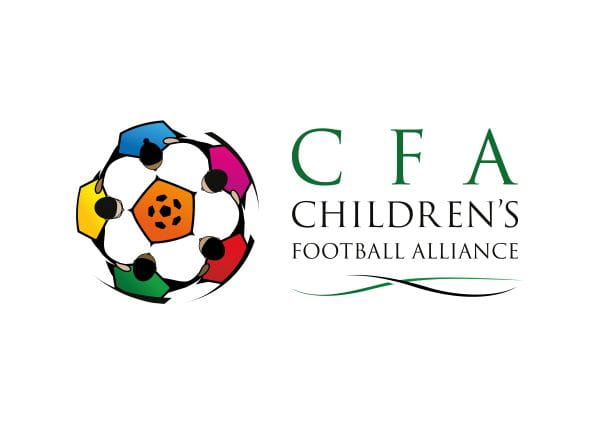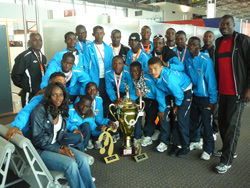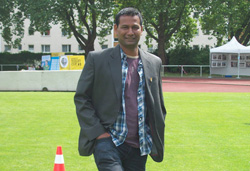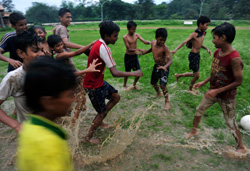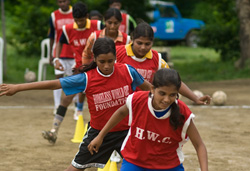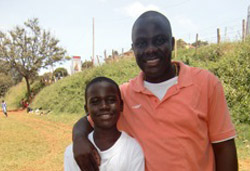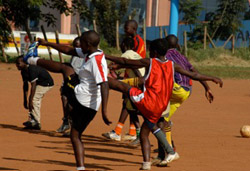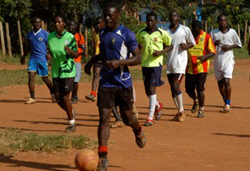INTERVIEW WITH ISHA JOHANSEN
http://www.fcjohansen.com/club/media.html Isha Johansen is a proactive humanitarian respected at home and abroad. Her vision to provide children and young people education, health and well-being through football in Sierra Leone has gained recognition across the globe. NCFA’s Founder Director Ernie Brennan (EB) caught up with Isha (IJ) at the Swizz Under 16s International Cup last August where FC Johansen picked up the winner’s trophy leaving many new admirers to look inwardly at the power of football to influence children and young people IJ. The club was established in 2004 and initially it was never the intention to form a football club. It was more of a humanitarian venture which was to support some of the orphaned and mainly underprivileged boys. The country at that time was still recovering from a brutal ten year civil war. My husband and I thought that by using football as a carrot, we could encourage the boys to stay focused in school thereby striking a balance between education and football. EB. What are the major problems that children and young people face playing football is Sierra Leone? IJ. I guess the youth since it is a young club with young players in comparism to other clubs in the premier league. EB. How successful is the Empowering Girls and Women in football projects in Sierra Leone? IJ. Not very as the FA in Sierra Leone are yet to put effective structures in place to get female football off the ground. That said, there has been some recent organisational changes within the FA to facilitate female football in schools and clubs. EB. What has been FC Johansen highlights to date? IJ. Taking the u-16 to participate in the Swiss U-16 cup and emerging champions. This resulted in some of the players being invited to Chelsea, Liverpool and Manchester City Academy. EB. What do you think the players get from playing in tournaments abroad and what positive aspects do these bring to the Club? IJ. These boys have never travelled beyond their natural environs so for them to enter into a plane alone is a big thrill. They get to meet other boys from different backgrounds and the sharing of knowledge and experiences is such a wonderful and positive injection into the club. EB. How important is it that the world of soccer acknowledges children who play the game in Africa? IJ. The talent there is abundant. The love and passion for football comes as naturally as does music and rhythm. Football is in many ways a way of life for kids in Africa. EB. Children in many cultures struggle to retain their birth right to play football, how does FC Johansen address this issue in the corridors of power? IJ. I do not think this is an issue in my country or indeed in FC Johansen. Like I said earlier, football is a way of life here so it’s a natural progression for any young boy who wants to play football to go ahead and play. EB. In your opinion is there scope for an International Children’s Football Alliance that could represent children on a global platform? An organisation that supports the world’s extended children’s football family and reinforces all the good work being done by organisations and clubs such as yourself. IJ. Absolutely. EB. Is there a FC Johansen project that you would like to tell our readers about and how they might like to support the good work being done? IJ. My husband and I have a 30 acre land which is some 45minutes away from the city. The objective is to build and academy with a few pitches, and a club house. It is hoped that through THE JOHANSEN NATIONAL SCHOOL OF SPORTS EXCELLENCE ACADEMY, we can be able to fully engage in the educational aspect of the club. We can get the older players who have not been able to make it to the professional stage to give back to society by teaching or coaching at the academy. We will also encourage farming/agriculture as part of the academy syllabus. INTERVIEW WITH ABHIJEET BARSE
http://www.slumsoccer.org/
What activities are Slum Soccer providing for children and where do Slum Soccer facilitate football in India? What kind of children participates in your football activities? Who are the volunteers that support Slum Soccer on the frontline? SS encourages all its participants to give education its due importance; our coaches keep a regular eye on how the children are doing in school. For other participants we are trying to provide out of school learning experience, based on their skill levels and interest. Can you tell us about the Project Sunshine Kids and working in association with Sunshine Foundation? http://sunshinefoundation.org.in/projects_khushaali.html . We intend to cover a lot of ground with project especially for female participants. Issues such as reproductive health and hygiene are being worked alongside with creating employment opportunity through this unique collaboration. Slum Soccer’s philosophy mentions ‘ ‘’¦the biggest factor that enables us to use football as a tool to connect with our people and bring about social development is quite stunningly simple. Football is fun! How difficult is it to convey this message in one of the world’s most celebrated cricket nations? Initially it was quite difficult, but as soon as our participants started getting opportunities for showcasing their talents and being acknowledged by their community it became easier for us. Most of the coaches are players who have gone through the program and are now training and encouraging younger children to take up football. Also the fact that football is easier to play and learn and also cheap helps a lot in popularizing in neglected sections of the society. Football for All is a basic Slum Soccer principle how is this worked into your methodology? Football is used as tool to get the dialogue started between communities, it helps us to make an inroad in otherwise closed communities. Once the participants start to play and practice together we start with the educating them about issues such social inclusion, gender issues, How important is it that the world of soccer acknowledges children who play the game outside of the radar of the professional game? One of the biggest achievements for our participants is the opportunity to play in the Homeless world Cup which gives equal importance football as well as development through football. When these participants come back after such as exposure, they start sharing their experience with their communities. We also train such participants to take up roles of leaders and mentors for other kids. From a football perspective such participants get to participate and be a part of good team outside our organization. Children in many cultures struggle to retain their birth right to play football, how does Slum Soccer address this issue in the corridors of power? Football still has a long way to go before it is considered important as compared to cricket. We are trying to promote football for the very reason that it is cheap and simple alternative to other sports. Also one of the biggest challenges is that sports is considered to be a competitor to education, it is this mindset that we are trying to break. We are trying to improve at the grassroots, but we hope that the effects will be reflected at the higher levels. In your opinion is there scope for an International Children’s Football Alliance that could represent children on a global platform? An organisation that supports the world’s extended children’s football family and reinforces all the good work being done by organisations such as yourself. Yes, absolutely. Having gone through your website i believe that you are trying to give football the much needed social/community side, instead of creating just footballers you are trying to create well rounded kids which by our standards is highly commendable. Is there a Slum Soccer project that you would like to tell our readers about and how they might like to support the good work being done? Very recently we started women’s football development project which is focussed on girls from our target areas. We need support in terms of female coaches, curriculum development and finances as well. Creating awareness about our work is also one area where we need support. |
||||||
INTERVIEW WITH IVAN KAKEMBO
http://www.uysocceracademy.com/ Uganda Youth Soccer Academy is a Non-profit Sports Organisation established in the Uganda in October ,2007 www.uysocceracademy.com to give hope and Education to slum and street children, Fighting Malaria, support Orphaned children born and affected by HIV/AIDS, Disabled children in urban slums, advocating for Children Rights and improved health and sanitation in Slums of Uganda through Sports.
What are the major problems that UYSA has to face? Without question the major problem is gathering the resources to help the children who live on the street and in the slums. There are forgotten by authorities and never sufficient donations to take care of all the needs. The larger picture is giving the children a voice through education and sports. We are always seeking sponsor families that will provide the child the way to obtain an education. Volunteers, whether they work within the Academy or with the local communities, college people volunteering from abroad to spend months working with the children or volunteers who give their time from home, through fund raising, spreading the word, all are important. Trained teachers in schools and coaches at the Academy teach the children in many areas of life skills. Who are the children that participate in UYSA football activities? Can you tell us what inspires you to carry out your work? Who are the biggest supporters of the UYSA? Our biggest supporters are the families in several countries that have sponsored a child and their continuing donations. Those generous donors and sympathiser who have contributed to our appeals in the past. Can you tell us how the sponsored children scheme works and why there is a need to support the scheme? Despite their proven sports potential in Uganda Today , many are uneducated, child bride, targeted as sex workers, raped and exposed to HIV/AIDS, girls and Women in Urban Slums have turned to fetching water and wood rather than learning to read and write and get involved in Sports and many Girls bear children while they are still children themselves and this limits their participation in sports. It is clear that UYSA and NCFA share similar values concerning football for all. How does UYSA educate parents, teachers and volunteers about why playing football is important to childhood? Our message is ongoing; through our communication with our monthly newsletter, our website, hundreds of posts on several social networks that are seen by thousands of people. Our sponsors and volunteers are found in many countries and through them, the goal of the Academy is spread. How important is it that the world of soccer acknowledges children who play the game outside of the radar of the professional game? As the sport becomes more and more popular with a wider audience, higher parental attendance, it is fast becoming the 4th most popular sport in the back of football, baseball and basketball. Children in many cultures struggle to retain their birth right to play football, how does UYSA address this issue in the corridors of power? In your opinion is there scope for an International Children’s Football Alliance that could represent children on a global platform? An organisation that supports the world’s extended children’s football family and reinforces all the good work being done by organisations such as yourself. Yes Is there a UYSA project that you would like to tell our readers about and how they might like to support the good work being done? We have very big priority to fundraise mosquito nets to save the live of children dying in Ugandan slums before their 5th Birthday and by donating a mosquito net can 99% save the live of this child |
||||||
INTERVIEW WITH HANSPETER ROTHMUNDhttp://footballismore.org/
Q. Can you tell National Children’s Football Alliance members a little about Football Is More? What are the ultimate aims that FIM would like to achieve? HP. The Foundation aims to continue supporting children and young people in difficult circumstances through specific sporting activities.
Q. Grand Hotel in Bad Ragaz, Switzerland. How successful was the forum and what kind of feedback did you receive? HP. Having seen the diverse multifaceted presentations and discussions about “Role Models ‘ Examples from the World of Football” there remains the impressive understanding: a huge number of organisations and institutions from around the world are committed to the well-being, encourage all children and young people in areas hit by crisis and war. The common ground and basis of all initiatives are the unifying and inspiring force and emotionality of a true world sport ‘ football. We could achieve our target to its full extent. The feedback we received was very positive, and the majority of delegates would like to join the next forum.
HP. People are highly social; they generally belong to a group. This may make a positive or a negative impact on young people. Football and the big clubs play an important role in this point. Q. The role model theme at the Forum was brilliantly illustrated by Don Mullen Irish author of ‘The Boy Who Wanted to Fly’ when he gave an emotional speech about his role model Gordon Banks. Why do you think role models are important in the game? HP. Parents and educators have a limited impact on their children regarding the choice of their role models. Children can have difficult choices and some role models can be challenging which can be a concern. Learning from role models, especially complex figures that are still maturing in public arenas, needs the sport to provide guidance; for instance, social responsibilities, public service and promoting fair play on and off the pitch. Furthermore, high profile role models’ behavior towards specific persons or groups can have a massive positive effect and we need to nurture this. Children aspire to GREATNESS, including these of football stars. A football star should be aware of his role! The forum was about people and organisations which brought and still bring an exemplary service free of selfish motives for young people from troubled or peripheral regions or young people with or without disability. This work is getting more and more important in today’s society. Q. Can you tell us about the previous projects undertaken in Kosovo, Sudan, Israel/Palestine and Sierra Leone? What do these projects have in common? HP. Football is the engine to implement social aspects. Football is a school of life! When playing football, the skin colour, the religion and gender is irrelevant. This tool can and should be used to help young people with development and furtherance. This is just the way the projects were planned and conducted. Notwithstanding that every region had different problems; the work could be conducted in a long-term and successful way. The key is football to unlock the door to development. Q. How can clubs and other organisations support the good work of FIM? HP. “together we are stonger” The clubs and NGO’s can touch base with us and we try to establish the right connections. Q. Who are the volunteers that support FIM and what do they bring to the Foundation? For our projects we rely on volunteers in different areas. Longer personal commitments are acknowledged through FOOTBALL IS MORE reports and certificates. Without our volunteers, some of our projects could not be implemented. Our volunteers are very important to us. Q. FIM Patron Wilfred Lemke, the UN Secretary-General’s Special Adviser on Sport for Development and Peace, appealed to the delegates to support the UN Millennium Development Goals (MDG). Are their plans for FIM to support MDG, if so, how? HP. We consider the MDG in each project and try to implement them successfully. We are very proud of the work of the UN in sport for Development FIM hope to support this with our projects. Q. As you know FIM share many aims of the NCFA. You state that FIM aim to, ‘Provide conditions in order to reach concrete social projects realistically. Projects, which focus on the integration of disadvantaged children and young people’. How do you intend to go about this good work in the current economic climate? HP. That’s a good question. Indeed, the economic situation is not really good. But we know that especially in such hard times people are moving towards each other and searching for solutions. This is why we hope to work with the NCFA and explore how we can make a difference. Q. As you know providing a voice for children in football is no easy task. How do you think FIM and NCFA can make governments sit up and actively support our work on an international level? HP. I believe that we have to continue our work and engage the politics at a level where they can support projects. They have to feel that some problems cannot be resolved on a political level, but with football it is possible. Q. In your opinion is there scope for an International Children’s Football Alliance that could represent children on a global platform? An organisation that supports the world’s extended children’s football family and reinforces all the good work being done by organisations such as FIM. HP. NCFA should ally with international organisations. I very much hope that FIM and NCFA implement some great projects. Q. Is there a FIM project that we can lookout for in the future and how might we be able to support it? HP. FIM is strongly focused on the integration/migration of disabled and non-disabled young people. |
